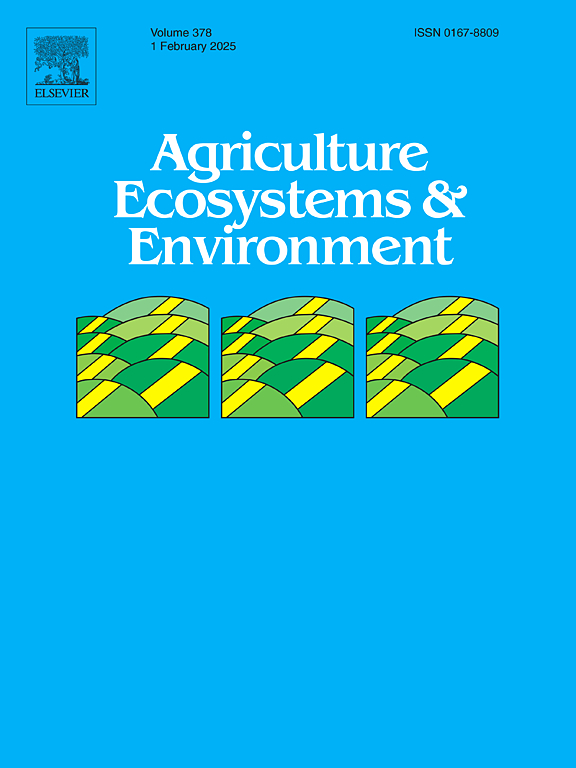Soil rhizobia promote plant yield by increasing tolerance to pests and pathogens under field conditions
IF 6
1区 农林科学
Q1 AGRICULTURE, MULTIDISCIPLINARY
引用次数: 0
Abstract
Nitrogen-fixing, root-colonizing rhizobia are abundant soil microbes that form mutualisms with legumes. Rhizobia provide direct benefits to hosts by fixing nitrogen and promoting nutrient acquisition. However, whether rhizobia indirectly alter plant yield by affecting insect pests and insect-borne pathogens is less well understood, with conflicting results from existing lab studies. Here we used a field experiment to test whether effects of rhizobia on plants extended beyond nitrogen provisioning to include greater tolerance to aphids and pathogens. Specifically, we manipulated field soil with four treatments: (i) untreated, (ii) sterilized, (iii) sterilized with nitrogen fertilizer, and (iv) sterilized with rhizobia; we then assessed the direct effects on plant yields as well as tolerance to pea aphids (Acyrthosiphon pisum) and an aphid-borne pathogen, pea enation mosaic virus (PEMV). Peas grown in soil inoculated with rhizobia had fewer aphids and lower PEMV incidence, which had strong positive effects on plant yield. Structural equation models further showed that rhizobia inoculation outperformed synthetic nitrogen fertilization in improving pea tolerance to aphids and PEMV, and rhizobia in turn had greater benefits on yields than fertilizer. In contrast, sterilization of soil increased aphid abundance and PEMV incidence compared to rhizobia-inoculated treatments and decreased pea yields. Our results show that mutualistic soil microbes can exert strong effects on aboveground pathosystems by directly promoting plant growth and altering the tolerance of plants to insects and pathogens.
固氮根瘤菌是与豆科植物形成互生关系的大量土壤微生物。根瘤菌通过固氮和促进养分获取为宿主提供直接益处。然而,根瘤菌是否会通过影响害虫和虫媒病原体来间接改变植物产量,目前还不太清楚,现有的实验室研究结果也相互矛盾。在这里,我们利用一项田间试验来检验根瘤菌对植物的影响是否超出了氮素供应的范围,而包括对蚜虫和病原体的更大耐受力。具体来说,我们对田间土壤进行了四种处理:(然后,我们评估了对植物产量的直接影响以及对豌豆蚜虫(Acyrthosiphon pisum)和蚜虫传播的病原体豌豆花叶病毒(PEMV)的耐受性。在接种了根瘤菌的土壤中生长的豌豆蚜虫更少,PEMV 的发病率更低,这对植株产量有很大的积极影响。结构方程模型进一步表明,在提高豌豆对蚜虫和 PEMV 的耐受性方面,接种根瘤菌的效果优于施用合成氮肥,而根瘤菌对产量的影响也大于肥料。相反,与接种根瘤菌的处理相比,土壤消毒会增加蚜虫数量和 PEMV 发生率,并降低豌豆产量。我们的研究结果表明,相生相克的土壤微生物可以直接促进植物生长,改变植物对昆虫和病原体的耐受性,从而对地上部分的病理系统产生强大的影响。
本文章由计算机程序翻译,如有差异,请以英文原文为准。
求助全文
约1分钟内获得全文
求助全文
来源期刊

Agriculture, Ecosystems & Environment
环境科学-环境科学
CiteScore
11.70
自引率
9.10%
发文量
392
审稿时长
26 days
期刊介绍:
Agriculture, Ecosystems and Environment publishes scientific articles dealing with the interface between agroecosystems and the natural environment, specifically how agriculture influences the environment and how changes in that environment impact agroecosystems. Preference is given to papers from experimental and observational research at the field, system or landscape level, from studies that enhance our understanding of processes using data-based biophysical modelling, and papers that bridge scientific disciplines and integrate knowledge. All papers should be placed in an international or wide comparative context.
 求助内容:
求助内容: 应助结果提醒方式:
应助结果提醒方式:


